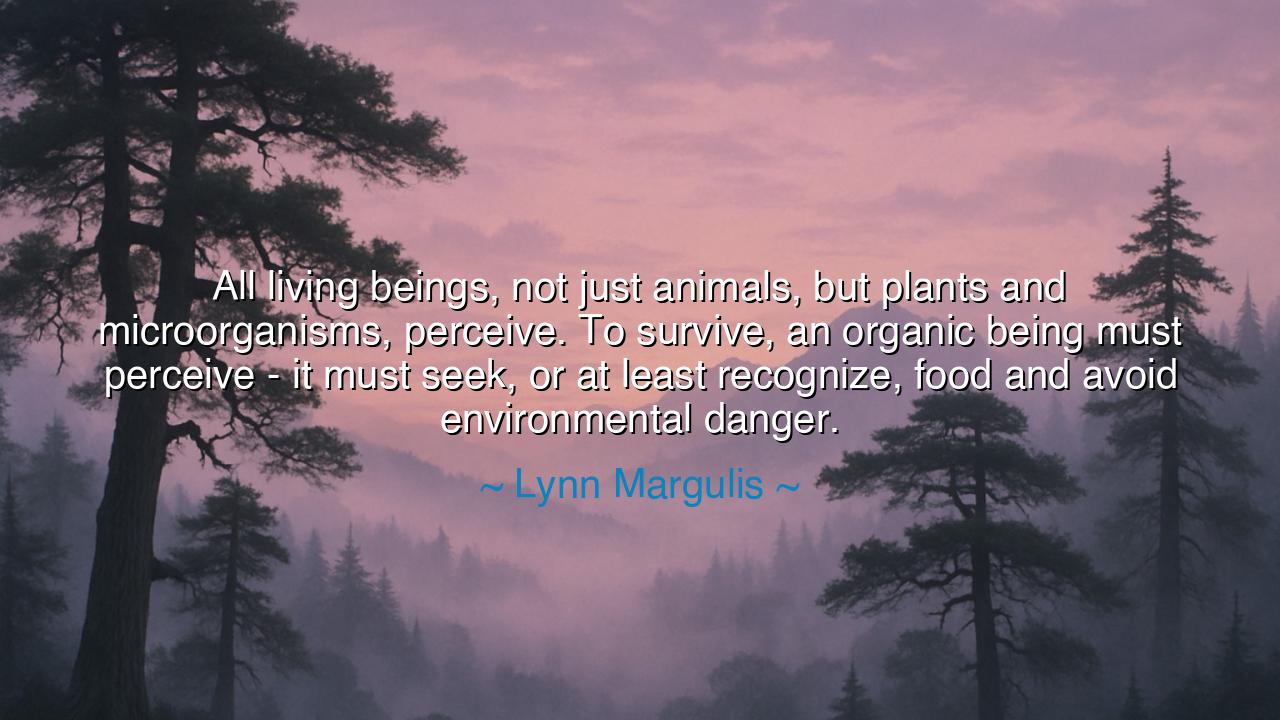
All living beings, not just animals, but plants and
All living beings, not just animals, but plants and microorganisms, perceive. To survive, an organic being must perceive - it must seek, or at least recognize, food and avoid environmental danger.






The soft hum of the café blended with the sound of rain gently tapping against the window. Jack sat across from Jeeny, his fingers loosely wrapped around his coffee cup, staring into the distance. The world outside seemed to blur with the weather, creating a feeling of quiet isolation. Jeeny, on the other hand, appeared deep in thought, her eyes fixed on the space between them, as if contemplating something important.
Host: The pause between them felt comfortable, but it didn’t last long. Jeeny broke the silence, her voice steady but filled with a sense of wonder.
Jeeny: “I came across a quote today by Lynn Margulis that made me think about perception in a way I hadn’t before. She said, ‘All living beings, not just animals, but plants and microorganisms, perceive. To survive, an organic being must perceive - it must seek, or at least recognize, food and avoid environmental danger.’ What do you think? Do you think all living beings perceive, even in ways we don’t immediately recognize?”
Jack: He looked up at her, a faint furrow in his brow as he considered her words. “It’s fascinating, isn’t it? The idea that perception isn’t limited to just humans or animals—it’s in all living organisms. Plants, microorganisms, they have some kind of awareness, even if it’s not the same as ours. They’re responding to their environment, reacting to light, to water, to danger. Maybe perception is more fundamental to life than we realize.”
Jeeny: “Exactly. It’s not just about sight or hearing. Perception, in its most basic form, is about recognizing what’s around you and responding to it in order to survive. Plants can sense changes in their environment, even if they don’t have a nervous system. They might not have the ability to move or think in the way we do, but they still perceive what’s happening around them—whether it’s how much sunlight they’re getting or whether there’s water nearby.”
Host: The rain outside had softened, but the conversation between them seemed to grow deeper, more reflective. Jack shifted in his seat, his gaze turning inward as he thought about the broader implications of what Jeeny had said.
Jack: “It makes me think about how connected all life forms are, in a way. Whether it’s an animal running from danger or a plant growing toward the light, everything is responding to its environment. We often think of perception as a conscious act, something we do deliberately, but maybe it’s more instinctual, more ingrained in life itself.”
Jeeny: Her voice was gentle but carried a quiet understanding. “Yes, it’s not about being aware in the same way we are, but it’s about interaction. Every living organism has some kind of way to gather information about the world and use it to survive. It’s fascinating how this fundamental drive to perceive and respond is shared across species, even if the way it happens looks completely different from one life form to another.”
Host: There was a shift in the atmosphere between them, as if the weight of their conversation had opened up a new lens through which to view the interconnectedness of all life. Jack’s fingers rested on his cup, his expression softening as he processed what Jeeny had said.
Jack: “So, perception isn’t just about sensing the world consciously—it’s an intrinsic part of being alive. Whether it’s the way a plant reacts to light or how an animal seeks food, perception is the driving force behind survival, the way life interacts with its environment. It’s almost like an instinctual connection between all living things and the world around them.”
Jeeny: “Exactly. It’s a kind of universal language, a response to the world that transcends species. Perception is how life adapts, how it understands what’s needed to thrive. And maybe that’s why we’re so connected to all life forms—because we share this essential drive to perceive, to interact, and to survive.”
Host: The quiet between them seemed to deepen as the conversation wound to a close. Outside, the rain had softened into a gentle mist, the world outside a blur, but inside, Jack and Jeeny sat in the realization that perception is not just an act of the mind—it’s a fundamental part of life itself. From the smallest microorganism to the largest animal, the act of perceiving is how all living things interact with their world, shaping their survival. The realization lingered, quiet and profound, like the rain outside.






AAdministratorAdministrator
Welcome, honored guests. Please leave a comment, we will respond soon